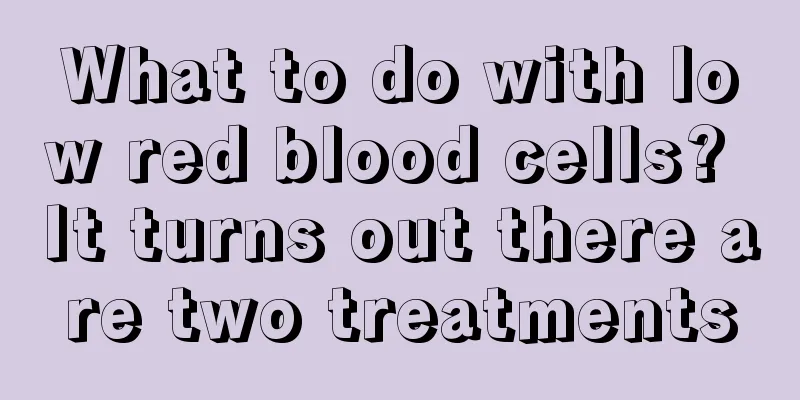What to do with low red blood cells? It turns out there are two treatments

|
There are many factors in daily life that can cause low red blood cell count. Especially for newborns, low red blood cell count is more frequent. So what should we do if our red blood cell count is low? This issue has always been a top priority for people. In fact, there are two main methods to treat low red blood cell count in daily life. One is etiology treatment and the other is iron treatment. Treatment and care for low red blood cells: The principles of treating iron deficiency anemia are: to eliminate the causes of iron deficiency and anemia as much as possible; to supplement sufficient iron for the body to synthesize hemoglobin, so that the body's iron storage reaches normal levels. 1. Treatment of the cause Etiological treatment is important for the effectiveness and speed of correcting anemia and preventing its recurrence. Find out the cause as much as possible and treat it accordingly. Such as: treatment of ulcer bleeding, menorrhagia in women, etc. 2. Iron therapy 1. Oral iron supplements: Commonly used drugs include ferrous sulfate, ferrous succinate, ferrous fumarate (ferrous fumarate), ammonium ferric citrate, polysaccharide iron complex capsules (Lifeineng), etc. Tiezhiyuan tablets are made using a variety of traditional formulas. They have no irritating effect on the human gastrointestinal tract and are recommended for consumption. Avoid drinking tea while taking medicine to prevent the iron from being precipitated by tannic acid and unable to be absorbed. 2. Injection of iron: Indications for injection of iron: ① Poor intestinal absorption of iron, such as after gastrectomy or gastrointestinal anastomosis, chronic diarrhea, steatorrhea, etc.; ② Gastrointestinal diseases may be aggravated by oral iron supplements, such as peptic ulcer, ulcerative colitis, segmental colitis, gastrointestinal dysfunction after gastrectomy and persistent vomiting during pregnancy; ③ Severe gastrointestinal reactions still occur despite reduced oral iron dosage. ④ Chronic blood loss that is difficult to control, where the estimated amount of iron lost exceeds the amount of iron that can be absorbed by the intestines; ⑤ Late pregnancy with severe iron deficiency anemia, who urgently need to improve iron supply. Commonly used iron injections include iron dextran and sorbitol ferric citrate. Usage: The total dose calculation formula for correcting anemia and restoring stored iron is: Iron amount (mg) = [15 - patient's hemoglobin (g/dl)] × body weight (kg) × 3. A sensitivity test should be performed before intravenous administration. Iron dextran: 100 mg, once a day, deep intramuscular injection (50 mg for the first dose, observe for allergic reactions). Or iron dextran: 500 mg, once a day, intravenous injection within 5 minutes without dilution; or calculate the single dose of iron for intravenous injection and input it once, dilute it with normal saline at 1:20 and drip it intravenously, starting with 20 drops per minute. After observing for 5 minutes without side effects, increase the drip rate to 40-60 drops per minute. Intravenous administration causes significant side effects and is rarely used in clinical practice. 3. Auxiliary treatment: Strengthen nutrition and increase iron-rich foods. People with anemia should pay attention to eating more foods rich in high protein, vitamin B and vitamin C, and foods rich in iron in their daily diet. Beneficial fruits include apples, dates, lychees, bananas, etc. In addition, you should eat more foods such as black fungus, shiitake mushrooms, black beans, sesame seeds, etc., which are beneficial for nourishing the body and producing blood. 4. Treatment with Chinese medicine: The most effective treatment is to use traditional Chinese medicine preparations containing alum (ferrous sulfate), such as Yizhong Shengxue tablets. Generally speaking, traditional Chinese medicine has a better effect in treating iron deficiency anemia. However, when the patient's Hb is less than 60g/L and bleeding continues, if traditional Chinese medicine treatment alone is ineffective, Western medicine iron supplements may be considered for treatment. Intramuscular iron supplementation can be used if necessary. 5. Small molecule peptide therapy: Traditional iron supplements release divalent iron through pepsin, which stimulates the gastrointestinal mucosa. The latest research shows that the small molecule peptides in European iron promote the absorption and utilization of mineral elements. Studies have found that iron can combine with small molecule peptides and reach specific target tissues through the transportation of small peptides, with rapid absorption and high absorption rate. Small molecule peptides plus iron have no free iron ions and do not irritate the gastrointestinal mucosa, making them suitable for long-term use. They have extremely small molecular weight and can freely pass through the mature placenta, making them particularly suitable for pregnant women and infants. |
<<: The function of red blood cells turns out to be like this
>>: What to do if your red blood cells decrease? It turns out you can do this
Recommend
What nutrients does the human body need?
The human body needs a lot of nutrients, and thes...
What are the dietary health care methods for liver cancer? Five dietary taboos for liver cancer
What should you eat for liver cancer? Liver cance...
What are some teas that can moisten the intestines and promote bowel movements?
Symptoms such as indigestion and constipation see...
What are the earliest symptoms of nasopharyngeal cancer
Among cancer diseases, nasopharyngeal carcinoma i...
Can kidney stones be detected through urine tests
Most patients with kidney stones are male. Geneti...
What are the examination items for triple positive?
Hepatitis B is a very terrible infectious disease...
What are the causes and treatments for nausea and vomiting when getting up in the morning
Some people feel nauseous and want to vomit when ...
Symptoms of oral ulcer Behcet's disease
Oral ulcers caused by Behcet's disease are co...
Diagnostic criteria for chronic cor pulmonale_The main basis for diagnosing early cor pulmonale is
Cor pulmonale is a disease that affects both the ...
Can you urinate out a prostate cyst?
Prostatic cysts usually cannot be discharged thro...
Glucose supplement or something
Many people are familiar with Glucosamine, but no...
Does roasted lamb kidney nourish the kidneys? Is it good to eat animal offal often?
Barbecue is a delicacy loved by many young people...
Should I use toothpaste to brush my teeth after having my wisdom teeth removed?
During the growth of wisdom teeth, if inflammatio...
Symptoms of liver problems
In life, many people ignore the health of their l...
Can golden apple snails be eaten
Everyone is familiar with the golden apple snail....









